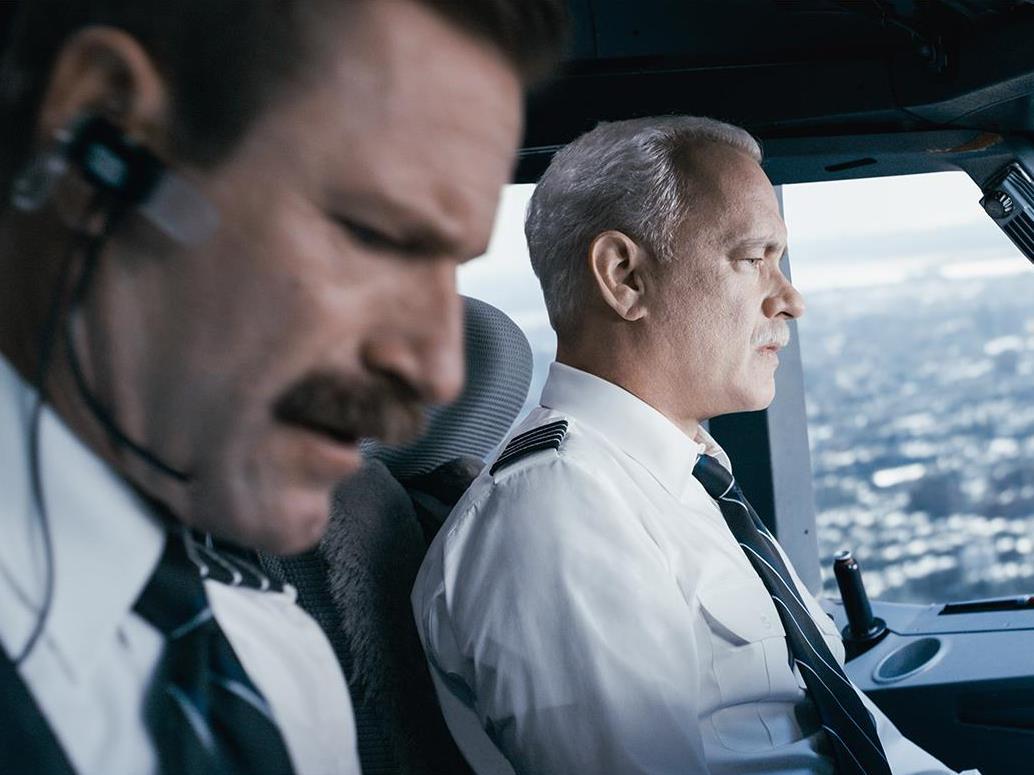In Sully‘s most complex moments, it recreates the chaos of a crashing plane, both based on actuality and envisioned in nightmares. Imbued with unrelenting tension, and staged with urgency and precision, such sights comprise the film’s most stirring sequences; however, as effective as they remain, they only tell part of the story. In the film’s simplest moments, it rests on the furrowed brow of its titular character (Tom Hanks, A Hologram for the King). Often staring out of windows or at the committee assembled to investigate his actions, his is a look that rolls the slightest traces of astonishment and anxiety into a composed countenance, whether he’s piloting US Airways Flight 1549 and its 155 passengers to an emergency water landing, pondering what could’ve been — or could’ve gone wrong — or answering the National Transportation Safety Board’s accusing questions.
Laden with all the more emotion every time Sully peppers another glimpse of potential aviation devastation into its running time, his is also an expression that proves the sum of its many parts, and not only as far as the extraordinary events of January 15, 2009 are concerned. The role of airline veteran Captain Chesley “Sully” Sullenberger feels like one adored everyman Hanks was destined to play; indeed, it’s one he portrays quietly and commandingly, as expected. A Clint Eastwood-directed dramatisation of the heroic incident dubbed “the miracle on the Hudson” also seems as though it was just as inevitable.
Together, the real-life figure, the actor that gives him filmic flesh and blood, and the helmer who has chosen to bring both to the screen combine for a movie that was always bound to chart a course into unashamedly idolatry and applauding territory. Adapted by Todd Komarnicki (Perfect Stranger) from the autobiography Highest Duty, Sully earns that description, though its evident fondness — for its subject, for spinning its story and for evoking the requisite emotional response among the viewing audience — is partially what makes the feature a solid effort and nothing more.
After 42 years of flying through the sky, Sully finds himself the cockpit alongside co-pilot Jeff Skiles (Aaron Eckhart, London Has Fallen), with their aircraft departing LaGuardia airport for another routine domestic route. Then, in the space no more than 208 seconds, the duo is forced to recover from a bird strike and dual engine failure. The aftermath garners highly publicised celebrations as well as formal scrutiny, which, for someone who says he was just doing his job, are equally difficult to handle. Sully intertwines the build up, suspenseful mid-air moments and fallout to paint a portrait of not just a tragedy historically averted, but of the person at its centre.
Following the heavy-handed dose of patriotism that was his last filmmaking credit, American Sniper, Eastwood scales back his style and rhetoric this time around, though not his earnestness. With mining US history, making tales of valour or combining both his remit in the later days of his directorial career, Sully fits neatly into his recent oeuvre — and, courtesy of a measured but still moving approach, endeavours to stress the similarities between its underlying tale and its filmmaker: experienced veterans just trying to do what they do well, with no fuss or need for fanfare.
Alas, Eastwood doesn’t always fare as well as his protagonist, particularly in fleshing out anyone other than Sully, providing more than one-note villains for his hero to tussle with, or avoiding an overdose of sentiment. Consequently, when aircraft are careening, the film soars; when they’re grounded, it’s Hanks that keeps the feature airborne.
Rating: 3 stars out of 5
Sully
Director: Clint Eastwood
USA, 2016, 98 mins
Release date: September 8
Distributor: Roadshow
Rated: M
Actors:
Director:
Format:
Country:
Release:





